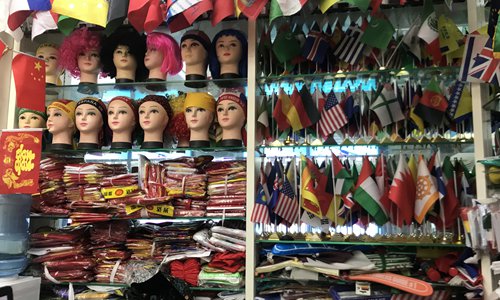Finding alternative suppliers likely to be difficult
Chinese wholesalers in Yiwu, East China's Zhejiang Province who are selling flags supporting US President Donald Trump's mid-term election campaign doubt the US will be able to shift its orders out of China and find alternative suppliers.

Flags and wigs are are on display in the Yiwu International Trade Center. (Photo: Xie Jun/Global Times)
However, amid the trade tension between the world's two largest economies, they said goods shipped from China to the US are spending more time than usual at US customs checkpoints and there has been a small drop in the number of orders.
"US flag vendors will not be able to live without Chinese manufacturers. Chinese products' price advantage and the long-term business relationship means that finding an alternative will prove more difficult than it seems," a shop keeper surnamed Wang at Qiwang Textile Product, a flag wholesaler, told the Global Times on Thursday.
His shop is in Yiwu's immense shopping mall, which sells commodities ranging from toys and towels to hardware.
"China is so potent in terms of low-cost manufacturing," Wang said.
Inside Wang's shop are samples of flags with messages such as "Trump 2020" and "Keep America Great!"
"If the US merchandisers want to find alternatives, they might look at some developing nations. But the price and quality may fall short of their expectations. All in all, you will probably only find the highest value delivered for the same price here in China," Yao Dandan, a manager at Shaoxing Keqiao Jiahao Arts & Crafts Co, a maker of national flags, told the Global Times.
Keqiao Jiahao Arts & Crafts Co has sold about 50,000 Trump flags so far this year, and the orders are increasing every day, Yao said.
Make America expensive
After starting a trade row with China by slapping a 25 percent tariff on $34 billion worth of Chinese exports to the US, the Trump administration on July 10 rolled out a new tariff list that includes some textiles. Flags and other textile products will be subject to a 10 percent levy if the proposed tariffs take effect in August.
According to an ABC report, the latest round of proposed tariffs by the US could push the price of "Make America Great Again" hats from around $9 to $20, citing a merchandiser who imports them.
Both Wang and Yao said there have been delays at the US customs and this has affected their sales volume and slowed down the pace of repeated purchases. They are not sure what caused the delays but suspect it has something to do with the current trade row.
"Usually the goods only take 10 days to reach US customers. Now it is taking 15 days or longer," Wu Yuepei, a manager at Qiwang Textile Product, told the Global Times on Thursday.
Li Lan, who works at Luxin Flag Industry selling national flags in Yiwu, said she is upset by the US trade policy and she dislikes Trump for his "capriciousness," referring to the sudden US decision to impose tariffs despite having conducted negotiations with China.
"Our industry has only been slightly affected by the trade dispute, but I feel angry to see that other Chinese companies are now being bullied by US trade policy," Yao said.
"But such a feeling should not disturb business. When we earn dollars, we are helping the economy of the motherland," Yao noted.
What lies beneath the US vendors' reliance on Chinese manufacturers is China's low-cost manufacturing chain and its front-to-end industrial capacity, from design to sampling to manufacturing and marketing, Bai Ming, deputy director of the International Market Research Institute under the Ministry of Commerce, told the Global Times.
"Even as a soccer match is still going on, the flags of the winning country are rolling down Chinese production lines at unrivaled speed. If emerging countries such as Vietnam try to do the same, the costs will be higher," Bai said.
"For potential competitors, what China does looks simple. But they can't do it the same," Bai said.
Cover Photo: VCG


